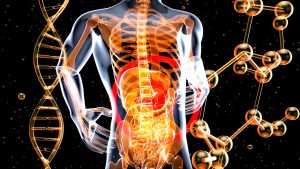 Most people understand the benefits of enzymes on some level. The most obvious one is that they act as catalysts to encourage a reaction to digesting food. However, there are many different types of enzymes, not all of which are used in digestion and many of which are used in processing food. For the body, its enzymes help break down, oxidize, hydrate and synthesize in the body. In fact, enzymes play a role in 12 systems of the body. While digestion is one of those functions, metabolism, blood pressure control, excretion via the kidneys, blood clotting, controlling the nervous system , wound healing and repair, reproduction, immunity and secretions are some others.
Most people understand the benefits of enzymes on some level. The most obvious one is that they act as catalysts to encourage a reaction to digesting food. However, there are many different types of enzymes, not all of which are used in digestion and many of which are used in processing food. For the body, its enzymes help break down, oxidize, hydrate and synthesize in the body. In fact, enzymes play a role in 12 systems of the body. While digestion is one of those functions, metabolism, blood pressure control, excretion via the kidneys, blood clotting, controlling the nervous system , wound healing and repair, reproduction, immunity and secretions are some others.
Digestive enzymes are the best known.
Most people understand that people who are lactose intolerant don’t produce the enzyme to digest the sugar in milk, lactase, or produce too little. That enzyme is important for digestion, just like protease is important for digesting peptides and amino acids, amylase breaks down carbs to glucose and lipase is important for digesting fatty acids and glycerol. People who lack digestive enzymes or produce smaller amounts than necessary, like those with lactose intolerance, have difficulty digesting certain foods, causing malabsorption and a great deal of gas.
Digestive enzymes also help break down nucleic acid to improve absorption.
Nucleic acid plays a role in producing a stronger immune system, improved digestion, quicker muscle recovery, reduced oxidative stress and improved metabolism. Metabolism has two parts, anabolism and catabolism. The first, anabolism changes smaller molecules into larger ones, while catabolism breaks down larger molecules to smaller forms. Anabolism is used for growth, survival and storing nutrients for later. Catabolism is necessary for removing toxins and waste from the body by breaking these substances down, so they can be removed in urine or feces. Excess glucose in the blood is also converted to glycogen by an enzyme and stored in the liver. Metabolic enzymes affect storage of energy and its release.
Enzymes play a role in your blood pressure.
Blood pressure is controlled by a hormone called angiotensin. If it’s too low, cells release renin. When that happens a chain reaction occurs, ultimately releasing an enzyme angiotensin-II that constricts vessels and raises blood pressure. If that enzyme is inhibited, people with high blood pressure will see their blood pressure drop.
- If you’re injured and bleeding, an enzyme called thrombin comes to the rescue. It causes the fibrinogen in the blood to convert to fibrin, which forms clotting strands. Other enzymes aid in absorbing dead tissue and creating new tissue.
- The nervous system controls all the functions of the body, in part, using neurotransmitters. Once their job is finished, enzymes help break them down so the continuation doesn’t create other problems in the body.
- Enzymes help in boosting the immune system, even when it’s in your mouth. Not only does the saliva contain enzymes that help digest food, but it also helps kill microbes in the food.
- Enzymes have become an important part of the food processing industry in the last 35 years. Could these enzymes be affecting our own body’s enzymes and proper functioning? Until that answer is known, eating whole foods is important.
For more information, contact us today at Next Level Fitness
